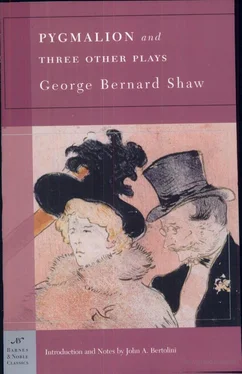But in practice you cannot persuade any wise man that this alternative can ever be forced on anyone but a fool, or that a fool can be trusted to learn anything from any experiment, cruel or humane. The Chinaman who burnt down his house to roast his pig [111] Reference to English essayist Charles Lamb’s “A Dissertation on Roast Pig,” from Essays of Elia (1823).
was no doubt honestly unable to conceive any less disastrous way of cooking his dinner; and the roast must have been spoiled after all (a perfect type of the average vivisectionist experiment); but this did not prove that the Chinaman was right: it only proved that the Chinaman was an incapable cook and, fundamentally, a fool.
Take another celebrated experiment: one in sanitary reform. In the days of Nero Rome was in the same predicament as London to-day. If some one would burn down London, and it were rebuilt, as it would now have to be, subject to the sanitary by-laws and Building Act provisions enforced by the London County Council, it would be enormously improved; and the average lifetime of Londoners would be considerably prolonged. Nero argued in the same way about Rome. He employed incendiaries to set it on fire; and he played the harp in scientific raptures whilst it was burning. I am so far of Nero’s way of thinking that I have often said, when consulted by despairing sanitary reformers, that what London needs to make her healthy is an earthquake. Why, then, it may be asked, do not I, as a public-spirited man, employ incendiaries to set it on fire, with a heroic disregard of the consequences to myself and others? Any vivisector would, if he had the courage of his opinions. The reasonable answer is that London can be made healthy without burning her down; and that as we have not enough civic virtue to make her healthy in a humane and economical way, we should not have enough to rebuild her in that way. In the old Hebrew legend, God lost patience with the world as Nero did with Rome, and drowned everybody except a single family. But the result was that the progeny of that family reproduced all the vices of their predecessors so exactly that the misery caused by the flood might just as well have been spared: things went on just as they did before. In the same way, the lists of diseases which vivisection claims to have cured is long; but the returns of the Registrar-General shew that people still persist in dying of them as if vivisection had never been heard of. Any fool can burn down a city or cut an animal open; and an exceptionally foolish fool is quite likely to promise enormous benefits to the race as the result of such activities. But when the constructive, benevolent part of the business comes to be done, the same want of imagination, the same stupidity and cruelty, the same laziness and want of perseverance that prevented Nero or the vivisector from devising or pushing through humane methods, prevents him from bringing order out of the chaos and happiness out of the misery he has made. At one time it seemed reasonable enough to declare that it was impossible to find whether or not there was a stone inside a man’s body except by exploring it with a knife, or to find out what the sun is made of without visiting it in a balloon. Both these impossibilities have been achieved, but not by vivisectors. The Rontgen rays [112] X rays; discovered by German physicist Wilhelm Konrad Rontgen in 1895.
need not hurt the patient; and spectrum analysis involves no destruction. After such triumphs of humane experiment and reasoning, it is useless to assure us that there is no other key to knowledge except cruelty. When the vivisector offers us that assurance, we reply simply and contemptuously, “You mean that you are not clever or humane or energetic enough to find one.”
It will now, I hope, be clear why the attack on vivisection is not an attack on the right to knowledge: why, indeed, those who have the deepest conviction of the sacredness of that right are the leaders of the attack. No knowledge is finally impossible of human attainment; for even though it may be beyond our present capacity, the needed capacity is not unattainable. Consequently no method of investigation is the only method; and no law forbidding any particular method can cut us off from the knowledge we hope to gain by it. The only knowledge we lose by forbidding cruelty is knowledge at first hand of cruelty itself, which is precisely the knowledge humane people wish to be spared.
But the question remains: Do we all really wish to be spared that knowledge? Are humane methods really to be preferred to cruel ones? Even if the experiments come to nothing, may not their cruelty be enjoyed for its own sake, as a sensational luxury? Let us face these questions boldly, not shrinking from the fact that cruelty is one of the primitive pleasures of mankind, and that the detection of its Protean disguises as law, education, medicine, discipline, sport and so forth, is one of the most difficult of the unending tasks of the legislator.
At first blush it may seem not only unnecessary, but even indecent, to discuss such a proposition as the elevation of cruelty to the rank of a human right. Unnecessary, because no vivisector confesses to a love of cruelty for its own sake or claims any general fundamental right to be cruel. Indecent, because there is an accepted convention to repudiate cruelty; and vivisection is only tolerated by the law on condition that, like judicial torture, it shall be done as mercifully as the nature of the practice allows. But the moment the controversy becomes embittered, the recriminations bandied between the opposed parties bring us face-to-face with some very ugly truths. On one occasion I was invited to speak at a large Anti-Vivisection meeting in the Queen’s Hall in London. I found myself on the platform with fox hunters, tame stag hunters, men and women whose calendar was divided, not by pay days and quarter days, [113] Days every three months when rent and other payments are due.
but by seasons for killing animals for sport: the fox, the hare, the otter, the partridge and the rest having each its appointed date for slaughter. The ladies among us wore hats and cloaks and head-dresses obtained by wholesale massacres, ruthless trappings, callous extermination of our fellow creatures. We insisted on our butchers supplying us with white veal, and were large and constant consumers of pate de foie gras; both comestibles being obtained by revolting methods. We sent our sons to public schools where indecent flogging is a recognized method of taming the young human animal. Yet we were all in hysterics of indignation at the cruelties of the vivisectors. These, if any were present, must have smiled sardonically at such inhuman humanitarians, whose daily habits and fashionable amusements cause more suffering in England in a week than all the vivisectors of Europe do in a year. I made a very effective speech, not exclusively against vivisection, but against cruelty; and I have never been asked to speak since by that Society, nor do I expect to be, as I should probably give such offence to its most affluent subscribers that its attempts to suppress vivisection would be seriously hindered. But that does not prevent the vivisectors from freely using the “youre another” retort, and using it with justice.
We must therefore give ourselves no airs of superiority when denouncing the cruelties of vivisection. We all do just as horrible things, with even less excuse. But in making that admission we are also making short work of the virtuous airs with which we are sometimes referred to the humanity of the medical profession as a guarantee that vivisection is not abused — much as if our burglars should assure us that they are too honest to abuse the practice of burgling. We are, as a matter of fact, a cruel nation; and our habit of disguising our vices by giving polite names to the offences we are determined to commit does not, unfortunately for my own comfort, impose on me. Vivisectors can hardly pretend to be better than the classes from which they are drawn, or those above them; and if these classes are capable of sacrificing animals in various cruel ways under cover of sport, fashion, education, discipline, and even, when the cruel sacrifices are human sacrifices, of political economy, it is idle for the vivisector to pretend that he is incapable of practising cruelty for pleasure or profit or both under the cloak of science. We are all tarred with the same brush; and the vivisectors are not slow to remind us of it, and to protest vehemently against being branded as exceptionally cruel and as devis ers of horrible instruments of torture by people whose main notion of enjoyment is cruel sport, and whose requirements in the way of villainously cruel traps occupy pages of the catalogue of the Army and Navy Stores.
Читать дальше












